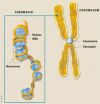(Press-News.org) New drugs that target specific molecular mechanisms of cancer have improved the treatment of cancer patients in recent years, but those benefits may come with a cost to the patient's sex life, researchers have found.
At the 35th Congress of the European Society for Medical Oncology (ESMO) in Milan, Italy, French researchers reported on one of the few studies to investigate the impact of cancer therapy on the sexual functioning of patients.
Dr Yohann Loriot and Dr Thomas Bessede from Institut Gustave Roussy in Villejuif, France and colleagues found that patients taking targeted therapies had significantly decreased levels of sexual function and satisfaction.
"The new molecular targeted therapies have been available for 6 or 7 years and researchers and physicians have observed some new side-effects not often reported with chemotherapy such as cutaneous side-effects and gastro-intestinal toxicity. But very few studies have been conducted in the field of sexuality, mainly because patients are not willing to talk with their physicians on this topic," Dr Loriot said.
The researchers surveyed 51 patients (40 men and 11 women) who had been taking molecular targeted therapies for more than three months without progressive disease about changes in their sexual life.
The drugs involved were sunitinib, sorafenib, temsirolimus, everolimus, bevacizumab, tarceva and cetuximab.
Men completed the International Index of Erectile Function (IEEF) questionnaire --which includes questions on erectile function, intercourse satisfaction, orgasmic function, sexual desire and overall satisfaction.
Women in the study completed the Female Sexual Function Index (FSFI) questionnaire, which includes questions on desire, arousal, lubrication, orgasm, satisfaction and pain.
The median overall IIEF score for men was 40, just 53% of the maximum score. For women, the median FSFI score was 8.4, just 24% of the maximum.
"The sex lives of the patients in our study had reduced quality and intensity," Dr Loriot said. "We also found that more than half of the patients expressed a wish for a satisfying sexuality, but many of them found it difficult to initiate a discussion on the topic with their doctors."
The impact of treatment on the sexuality of cancer patients is poorly understood, and is generally not considered in clinical trials of treatments, Dr Loriot said.
"Oncologists can address this issue first by assessing this concern more often in clinical trials, and by talking with their patients about it," he said.
He suggested that oncologists could offer patients an assessment for sexual disorders during their treatment course, establish an outpatient clinic to deal with sexual disorders, or, if needed, refer patients to a specialist.
Sexuality is a major concern for cancer patients, as it is for everyone, noted Professor Raphael Catane, Chair of the department of oncology at Sheba Medical Center in Tel Hashomer, Israel. "The disease itself, and frequently its therapy, may have a major detrimental effect on the patient's sex life. It is hoped that the new biological/targeted treatments would be less injurious to the sexual life of cancer patients. "
"The study by this French group has taken an important step toward understanding the effect of biological/targeted treatments on sexuality," Prof Catane said. "They meticulously reviewed the sexual function of their patients receiving biological agents. The results show a diminished sexual drive and pleasure, but the degree and the duration, and how it compares to the standard/conventional therapy, is not yet known. This study can be a basis for further investigation of this very important aspect of cancer therapy."
INFORMATION: END
Lung cancer patients who have already been treated with the EGFR inhibitors erlotinib or gefitinib seem to gain further benefits in terms of progression-free survival and tumor shrinkage when treated with the new drug afatinib, the results of a Phase IIb/III trial show.
At the 35th Congress of the European Society for Medical Oncology (ESMO) in Milan, Italy, Dr Vincent Miller from Memorial Sloan-Kettering Cancer Center in New York, USA, reported findings from the LUX-Lung 1 trial of afatinib in 585 patients with lung adenocarcinoma whose cancer had progressed after chemotherapy ...
A new-generation lung cancer drug has shown an impressive ability to prevent disease progression when administered as a first-line treatment in patients with advanced disease, investigators reported at the 35th Congress of the European Society for Medical Oncology (ESMO).
Preliminary results from an ongoing Phase-II trial of the drug PF299804 (PF-299) showed that close to 85% of patients whose cancers harbor mutated forms of the EGFR gene have remained progression-free for at least nine months, reported Dr Tony Mok from the Chinese University of Hong Kong.
While some ...
An ongoing Phase-II trial investigating a new, targeted therapy for metastatic urothelial cancer has generated promising early results, Italian researchers reported at the 35th Congress of the European Society for Medical Oncology (ESMO) in Milan, Italy.
Urothelial cancers affect the tissue lining the inner surfaces of the bladder and other parts of the urinary system. In cases of metastatic disease, median survival is approximately 12-15 months and there is a 10-15% chance of prolonging it by the use of standard chemotherapy regimens, particularly in otherwise healthy ...
The results of a large Phase-III clinical trial have shown that the drug everolimus delays tumor progression in patients with a hard-to-treat group of rare cancers that affect particular hormone-producing cells.
At the 35th Congress of the European Society for Medical Oncology (ESMO), Dr Marianne Pavel from Charité University in Berlin, Germany reported that everolimus improved progression-free survival by 5.1 months in patients with advanced neuroendocrine tumors.
Neuroendocrine tumors are slow-growing malignancies that originate from cells of the body's neuroendocrine ...
A new class of compounds identified by researchers at Emory University School of Medicine could be developed into drugs for the treatment of schizophrenia. The compounds enhance signaling by molecules in the brain called NMDA receptors, which scientists believe are functioning at low levels in people with schizophrenia.
Led by Stephen Traynelis, PhD, professor of pharmacology, a team of Emory researchers sifted through thousands of chemicals and found one, called CIQ, which could selectively enhance the function of certain NMDA receptors without affecting others.
The ...
Iowa City, IA—October 11, 2010— A new study published in Applied Cognitive Psychology finds that college-aged men are very likely to remember a woman's initial sexual interest (attraction or rejection), especially when the woman in question is thought to be attractive, is dressed more provocatively, and expresses positive sexual interest.
In the study the men were shown full-body photographs of college-aged women who expressed cues of sexual interest or rejection. The participating males represented mixed sexual histories, and a capacity for varying degrees of sexually ...
GAINESVILLE, Fla. --- University of Florida researchers presenting new fossil evidence of an exceptionally well-preserved 55-million-year-old North American mammal have found it shares a common ancestor with rodents and primates, including humans.The study published today in the online edition of the Zoological Journal of the Linnean Society, describes the cranial anatomy of the extinct mammal, Labidolemur kayi.
High resolution CT scans of the specimens allowed researchers to study minute details in the skull, including bone structures smaller than one-tenth of a millimeter. ...
The genetic inherited material DNA was long viewed as the sole bearer of hereditary information. The function of its packaging proteins, the histones, was believed to be exclusively structural. Additional genetic information can be stored, however, and passed on to subsequent generations through chemical changes in the DNA or histones. Scientists from the Max Planck Institute for Biophysical Chemistry in Göttingen have succeeded in creating an experimental system for testing the function of such chemical histone modifications and their influence on the organism. Chemical ...
More brilliant X-rays, more cost-effective methods for developing new energy sources and advanced manufacturing processes are just some of the benefits which may come from a novel technology, proven at the theoretical level by a consortium of British and European laser scientists. The research, led by scientists at the Science and Technology Facilities Council's Central Laser Facility is published in this week's edition of Nature Physics (October 10 2010).
A team of scientists from the Instituto Superior Tecnico in Lisbon, Imperial College London, and the Universities ...
A University of Colorado at Boulder space dust counter designed, tested and operated by students that is flying aboard NASA's New Horizons mission to Pluto now holds the record for the most distant working dust detector ever to travel through space.
The instrument on the New Horizons mission -- officially named the Venetia Burney Student Dust Counter, or SDC, after an 11-year-old English girl who named Pluto more than 75 years ago -- reached a distance of 1.67 billion miles from Earth on Oct. 10. Designed by a student team from CU-Boulder's Laboratory for Atmospheric ...


